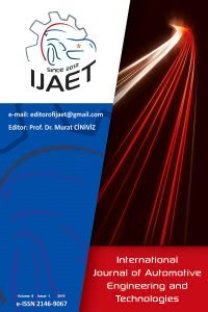Wear And Frictional Behaviours of Automotive Brake Pad Sliding Against GG 20 Cast Iron Counter Face
In the present study, wear and frictional behaviours of automotive brake pad sliding against GG 20 cast iron counter face have been investigated experimentally using a pin on disc type friction tester. Wear tests were carried out under dry conditions. A central composite design was used to describe response and to estimate the process parameters in the model. Empirical models have been developed to predict wear loss and friction coefficient as a function of contact pressure and sliding velocity using multiple regression. The statistical analysis show that the contact pressure is identified as the most dominant factor affecting wear loss, sliding velocity is identified is the most dominant factor affecting friction coefficients.
Keywords:
wear, friction coefficient, central composite design regression model, friction,
___
- S. K. Mehra: A review of experimental study of brake pad material, International Journal of Emerging Trends in Engineering and Development 6, 3, pp. 252-256, 2013.
- D. Chan, G. W. Stachowiak: Review of automotive
- Proceedings of the Institution of Mechanical Engineers 218, pp. 953–966, 2004.
- W. Osterle, I. Urban: Friction layers and friction films on PMC brake pads, Wear 257, pp. 215–226, 2004.
- K. W. Liew, U. Nirmal: Frictional performance evaluation of newly designed brake pad materials, Materials and Design 48, pp. 25-33, 2013.
- S. K. Rhee, M. G. Jacko, P. H. S. Tsang: The role of friction film in friction, wear and noise of automotive brakes, Wear 146, pp. 89–97, 1991.
- Y. Liu, Z. Fan, H. Ma, Y. Tan, J. Qiao: Application of nano powder rubber in friction materials, Wear 261, pp. 225-229, 2006.
- P. J. Blau, J. C. Mclaughlin: Effects water films and sliding speed on the frictional behavior of truck disc brake material, Tribology International 36, pp. 709-715, 2003.
- B. K. Satapathy, J. Bijwe: Wear data analysis of friction materials to investigate the simultaneous influence of operating parameters and compositions, Wear 256, pp. 797–804, 2004.
- S. J. Kim, H. Jang: Friction and wear of friction materials containing two different phenolic resins reinforced with aramid pulp, Tribology International 33, pp. 477–484, 2000.
- I. Mutlu, C. Oner, F. Findik: Boric acid effect in phenolic composites on tribological properties in brake linings, Materials and Design 28, pp. 480–487, 2007.
- K. W. Hee, P. Filip: Performance of ceramic enhanced phenolic matrix brake lining materials for automotive brake linings, Wear 259, pp. 1088–1096, 2005.
- N. S. M. El-Tayeb, K.W. Liew: On the dry and wet sliding performance of potentially new frictional brake pad materials for automotive industry, Wear 266, pp. 275– 287, 2009.
- M. H Cho, K. H. Cho, S. J. Kim, D. H. Kim, H. Jang: The role of transfer layers on friction characteristics in the sliding interface between friction materials against gray iron brake discs, Tribology Letters 20, pp. 101– 108, 2005.
- A. Sagbas, F. Kahraman, U. Esme: Modeling and predicting abrasive wear behaviour of poly oxy methylenes using response surface methodology and neural networks, Metalurgija 48, 2, pp. 117-121, 2009.
- N. S. M. El-Tayeb, T. C. Yap, V. C. Venkatesh, P. V. Brevern: Modeling of cryogenic frictional behaviour of titanium alloys using response surface methodology approach, Materials and Design 30, pp. 4023- 4034, 2009.
- S. Basavarajappa, G. Chandramohan, J. Paulo Davim: Application of Taguchi techniques to study dry sliding wear behaviour of metal matrix composites, Materials and Design 28, pp. 1393-1398, 2007.
- B. P. Chang , H. M. Akil, R. B. Nasir, A. Khan: Optimization on wear performance of UHMWPE composites using response surface
- International 88, pp. 252–262, 2015.
- F. Kahraman, K. B. Sugözü: Predicting and analyzing abrasive wear loss of poly oxy methylenes
- methodolgy, International Participation III. Ege Composite Materials Symposium, Aydın, Turkey, 2015.
- H. Zhang, Z. Li, Z. Chen: Application of grey modeling method to fitting and forecasting wear trend of marine diesel engines, Tribology International 36, 10, pp. 753–756, 2003.
- S.C. Vettivel, N. Selvakumar, N. Leema: Experimental and prediction of sintered Cu– W composite by using artificial neural networks, Materials and Design 45, pp. 323– 335, 2013.
- R. H. Myers, D. C. Montgomery, C. M. Anderson-Cook. Methodology:
- Optimization Using Designed Experiments, ISBN 1118210476, 9781118210475, John Wiley & Sons Inc., New York, 2002.
- Başlangıç: 2012
- Yayıncı: Murat CİNİVİZ
Sayıdaki Diğer Makaleler
Investigation of Effect of Propane and Methane Gases on Commercial Catalytic Converter Activity
Cihan Bayındırlı, Yahya Erkan Akansu, Mustafa Sahir Salman
The Determination of Aerodynamic Drag Coefficient of Truck and Trailer Model by Wind Tunnel Tests
Cihan BAYINDIRLI, Y. Erkan AKANSU, M. Sahir SALMAN
The Simulation of a Full Electric Vehicle Using the City Cycle
